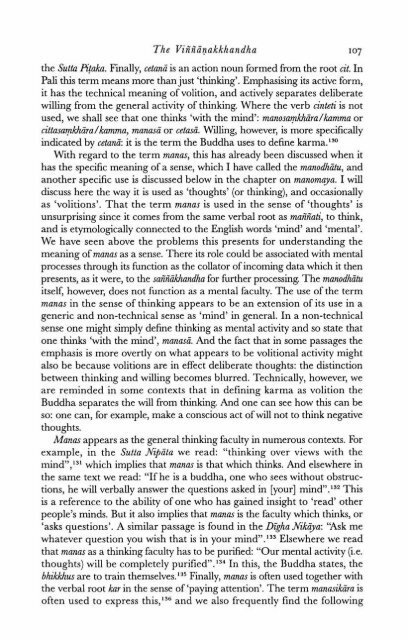Identity and Experience_Hamilton_1996
Identity and Experience_Hamilton_1996
Identity and Experience_Hamilton_1996
You also want an ePaper? Increase the reach of your titles
YUMPU automatically turns print PDFs into web optimized ePapers that Google loves.
The Viiiiia'nakkh<strong>and</strong>ha 107<br />
the Sutta Pitaka. Finally, cetanii is an action noun formed from the root cit. In<br />
Pali this term means more than just 'thinking'. Emphasising its active form,<br />
it has the technical meaning of volition, <strong>and</strong> actively separates deliberate<br />
willing from the general activity of thinking. Where the verb cinteti is not<br />
used, we shall see that one thinks 'with the mind': manosamkhiira/kamrna or<br />
cittmamkhiira/kamma, rnanasii or cetasi. Willing, however, is more specifically<br />
indicated by cetank it is the term the Buddha uses to define karma.130<br />
With regard to the term manas, this has already been discussed when it<br />
has the specific meaning of a sense, which I have called the manodha'tu, <strong>and</strong><br />
another specific use is discussed below in the chapter on manomaya. I will<br />
discuss here the way it is used as 'thoughts' (or thinking), <strong>and</strong> occasionally<br />
as 'volitions'. That the term manas is used in the sense of 'thoughts' is<br />
unsurprising since it comes from the same verbal root as maEEati, to think,<br />
<strong>and</strong> is etymologically connected to the English words 'mind' <strong>and</strong> 'mental'.<br />
We have seen above the problems this presents for underst<strong>and</strong>ing the<br />
meaning of manas as a sense. There its role could be associated with mental<br />
processes through its function as the collator of incoming data which it then<br />
presents, as it were, to the saiiiiiikh<strong>and</strong>ha for further processing: The manodhitu<br />
itself, however, does not function as a mental faculty. The use of the term<br />
manas in the sense of thinking appears to be an extension of its use in a<br />
generic <strong>and</strong> non-technical sense as 'mind' in general. In a non-technical<br />
sense one might simply define thinking as mental activity <strong>and</strong> so state that<br />
one thinks 'with the mind', manmi. And the fact that in some passages the<br />
emphasis is more overtly on what appears to be volitional activity might<br />
also be because volitions are in effect deliberate thoughts: the distinction<br />
between thinking <strong>and</strong> willing becomes blurred. Technically, however, we<br />
are reminded in some contexts that in defining karma as volition the<br />
Buddha separates the will from thinking. And one can see how this can be<br />
so: one can, for example, make a conscious act of will not to think negative<br />
thoughts.<br />
Manas appears as the general thinking faculty in numerous contexts. For<br />
example, in the Sutta JV$iita we read: "thinking over views with the<br />
mind" , 131 which implies that manas is that which thinks. And elsewhere in<br />
the same text we read: "If he is a buddha, one who sees without obstructions,<br />
he will verbally answer the questions asked in [your] mind".132 This<br />
is a reference to the ability of one who has gained insight to 'read' other<br />
people's minds. But it also implies that manas is the faculty which thinks, or<br />
'asks questions'. A similar passage is found in the DQha Nikga: 'Ask me<br />
whatever question you wish that is in your mind".lS3 Elsewhere we read<br />
that manas as a thinking faculty has to be purified: "Our mental activity (i.e.<br />
thoughts) will be completely purified".134 In this, the Buddha states, the<br />
bhikkhus are to train them~e1ves.l~~ Finally, manas is often used together with<br />
the verbal root kar in the sense of 'paying attention'. The term manaxihra is<br />
often used to express this,'36 <strong>and</strong> we also frequently find the following


